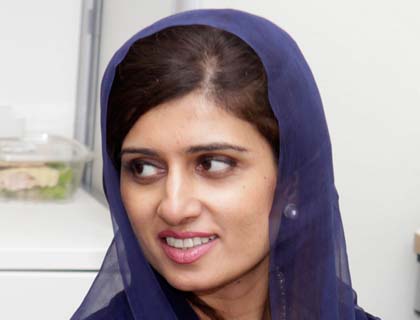The recent visit of Pakistani Foreign Minister, Hina Rabbani Khar, to Kabul had two distinct qualities that cannot be disregarded. First, it served as a major outreach by the Pakistani government into major leaders of the erstwhile Northern Alliance as well as to the government of President Karzai. The Pakistani Foreign Minister, during his visit, met with one of the prominent leaders of the Junbish Party as well as with Ustad Muhaqiq and Yunos Qanooni, each regional heavy weight with mass following. Khar's visit was a forceful demonstration by Pakistan's civilian government that it is indeed committed to exploring avenues of greater diplomacy – the military "government" in Pakistan, however, is another story.
The second distinct quality of Khar's visit to Kabul was the displeasure that it stirred in certain circles in Washington. It seems extremely odd that a "leak" of a NATO report accusing Pakistan of double-dealing in Afghanistan comes out in the wake of the Pakistani Foreign Minister's visit to Afghanistan.
The latest "leak" of a NATO report repeating the usual accusation of Pakistani agencies extending support to Taliban was the ultimate tell-tale sign of the U.S.'s discomfort at the prospect of Pakistan and Afghanistan crawling up to each other and huddling together in the winter cold of the Hindu Kush mountains.
This "leak", in fact, was anything but a leak; it was a blatantly deliberate attempt by some circles in Washington to muddy the waters between Pakistan and Afghanistan using the usual card of ISI and the same old story of its covert help to Afghan Taliban. The NATO's report might indeed be true; however, the timing and the ulterior motives of this "leak" serves some other purpose other than helping Afghanistan and Pakistan warming up to each other. After all, "divide and rule", it seems, has never lost its utility in the toolbox of imperial hegemons.
This visit of Pakistani Foreign Minister to Afghanistan had an important direct outcome in terms of securing a visit to Islamabad by Hamid Karzai. Karzai will visit Pakistan later this month. The visit would go a long way in quest for normalizing relations at least with the civilian government in Pakistan.
The military, as said, is another story. Such visits by the civilian leadership of Pakistan would serve the crucial purpose of helping both the governments explore bilateral relations and avenues of shared cooperation. In the rulebook of international diplomacy, confidence-building and gradual alignment of interests and convergence of important national concerns form the backbone of a country's strategy to improve relations with others especially with its neighbors.
In the case of Afghanistan and Pakistan, both the governments can be placed in an ideal position to unpack the baggage of decades-old issues and work towards resolving them. The pre-requisite for this, however, is building confidence, initiating wide-ranging contacts and dialogue and sizing up one another through increased bi-lateral meetings.
Unfortunately, the word 'Pakistan' still evokes unpleasant memories and a myriad of decades-old clichés in the political culture of today's Afghanistan. This political mindset needs to be changed in tandem with this reality that the civilian government in Pakistan has time and again shown its willingness to engage with Afghanistan in a positive and constructive manner and has not shied away from confronting some of the most difficult issues that has plagued the relations between the two countries.
As far as the current civilian government in Pakistan is concerned, what is encouraging is that this government has proved its willingness to pursue an open and constructive foreign policy – one that is shaped and crafted in response to and considering the needs of today's Pakistan and today's regional and global conditions. The outlook and mentality of Pakistani military might indeed be rather obsolete and a remainder of the years of the Cold War. That, however, has not been helpful.
In line with these efforts by Pakistan's civilian government to pursue a constructive foreign policy, this visit by Pakistan's Foreign Minister has shown the interest of the civilian government in Pakistan in seeing an Afghan peace process that is genuinely Afghan-led.
As far as the civilian government in Pakistan is concerned, its interests lie in a peace process in Afghanistan that is inclusive of all the parties to the decades-old conflict. This is, in part, a reason for RabbaniKhar's insistence to also meet a wide section of major ethnic leaders here in Afghanistan.
The civilian government in Pakistan is keen to network more extensively with various factions and ethnic groups within the Afghan mosaic and deems it necessary in order to better shape the country's relations with Afghanistan in the context of the ongoing peace process.
RabbaniKhar had this to say about his government's efforts to broaden the base of his country's relations with Afghanistan: "The point is, we are reaching out to all of Afghanistan, and that should be fine. We want to build relations that are country-to-country people-to-people.
These are relationships that are sustainable for the long term. Pakistan is typically seen to be too attached to one part within Afghanistan [the Taliban], so I think that is a myth that needs to be broken. I am calling it a myth because I don't think it has been true for the past ten-plus years. So therefore it is important to send a message that whoever is important in Afghanistan is important to Pakistan." This might indeed prove to be a new beginning in the two countries bi-lateral relations as far as the civilian government in Pakistan is concerned.

